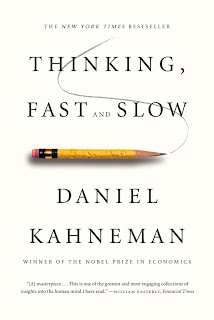In this book the Nobel prize winning psychologist Daniel Kahneman explains how our mind works as if it housed two separate systems, each one with its own skills, specialized in dealing with different circumstances: the fast and slow thinkers the book title is about.
System 1 is automatic, always switched on, intuitive, looking out for surprises or anomalies, keen on stereotyping and sampling. It is very good at doing what it does, most of the time that is, but is sometimes prone to catastrophic errors. System 2, on the other hand, is analytical, logical, statistical, can perform complex calculations and reasoning, but it’s lazy and effortful, in sleeping mode as often as not, and might also act as an apologist for its mate’s shortcomings.
The two systems don’t really exist: they are just useful models that help us understand how and why our mind acts the way it does when confronted with specific situations.
By means of this structure Kahneman teaches us how we unconsciously use heuristics to simplify complex problems and how that mechanism can generate biases. He tells us how our innate overconfidence can make us feel extremely at ease when we make our worst blunders. He lists the rules we follow when we make important decision or choose between various options, sometimes even against our own best interests. He exposes the weaknesses of the dominant economics theory that treats human beings as rational agents (the so called mythical “econs”, as opposed to the real humans), and concludes by illustrating how the struggle between our “remembering” and “experiencing” selves is often won by the former, leading us to choose greater suffering, if that leads to a better memory of the event.
This book teaches us about the manufacturing defects of our mind, so that we can learn how to minimize their effects and consequences.

No comments:
Post a Comment